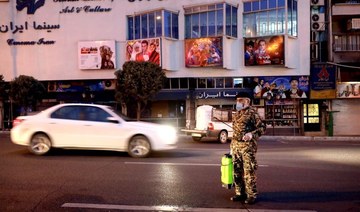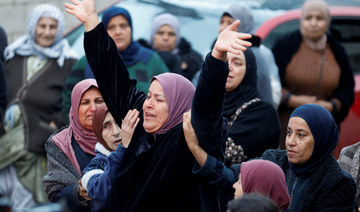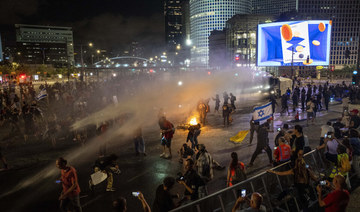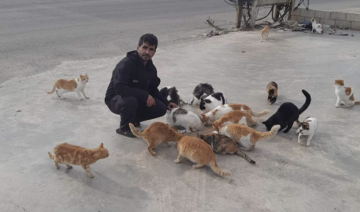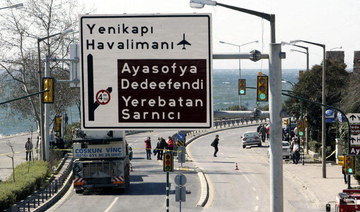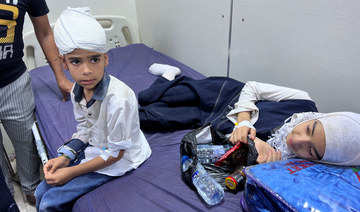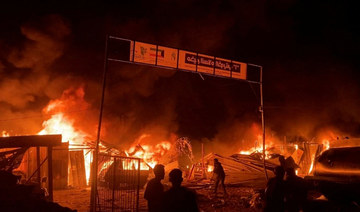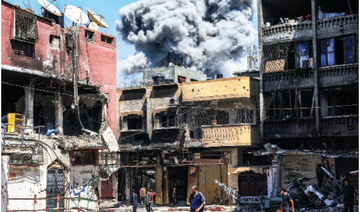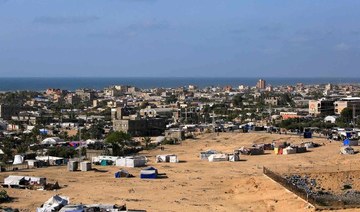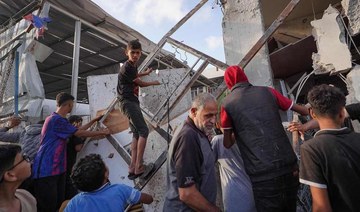TEHRAN: Standing over the still body of an intubated 5-year-old boy wearing nothing but a plastic diaper, an Iranian health care worker in a hazmat suit and mask begged the public for just one thing: Stop drinking industrial alcohol over fears about the new coronavirus.
The boy, now blind after his parents gave him toxic methanol in the mistaken belief it protects against the virus, is just one of hundreds of victims of an epidemic inside the pandemic now gripping Iran.
Iranian media reports nearly 300 people have been killed and more than 1,000 sickened so far by ingesting methanol across the Islamic Republic, where drinking alcohol is banned and where those who do rely on bootleggers. It comes as fake remedies spread across social media in Iran, where people remain deeply suspicious of the government after it downplayed the crisis for days before it overwhelmed the country.
“The virus is spreading and people are just dying off, and I think they are even less aware of the fact that there are other dangers around,” said Dr. Knut Erik Hovda, a clinical toxicologist in Oslo who studies methanol poisoning and fears Iran’s outbreak could be even worse than reported. “When they keep drinking this, there’s going to be more people poisoned.”
For most people, the new coronavirus causes mild or moderate symptoms, such as fever and cough that clear up in two to three weeks. For some, especially older adults and people with existing health problems, it can cause more severe illness, including pneumonia, or death.
The pandemic has swept across the world, overwhelming hospitals, crippling economies and forcing governments to restrict the movements of billions of people. Particularly hard hit has been Iran, home to 80 million people.
As of now, there is no known cure for COVID-19, the illness caused by the virus. Scientists and doctors continue to study the virus and search for effective medicines and a vaccine.
But in messages forwarded and forwarded again, Iranian social media accounts in Farsi falsely suggested a British school teacher and others cured themselves of the coronavirus with whiskey and honey, based on a tabloid story from early February. Mixed with messages about the use of alcohol-based hand sanitizers, some wrongly believed drinking high-proof alcohol would kill the virus in their bodies.
The Islamic Republic has reported over 29,000 confirmed cases and more than 2,200 deaths from the virus, the highest toll of any country in the Middle East. International experts also fear Iran may be under-reporting its cases, as officials for days played down the virus ahead of a parliamentary election.
That fear of the virus, coupled with poor education and Internet rumors, saw dozens sickened by drinking bootleg alcohol containing methanol in Iran’s southwestern Khuzestan province and its southern city of Shiraz. Videos aired by Iranian media showed patients with IVs stuck in their arms, laying on beds otherwise needed for the fight against the coronavirus, including the intubated 5-year-old boy. Iranian media also reported cases in the cities of Karaj and Yazd.
In Iran, the government mandates that manufacturers of toxic methanol add an artificial color to their products so the public can tell it apart from ethanol, the kind of alcohol that can be used in cleaning wounds. Ethanol is also the kind of alcohol found in alcoholic beverages, though its production is illegal in Iran.
Some bootleggers in Iran use methanol, adding a splash of bleach to mask the added color before selling it as drinkable. Sometimes it is mixed with consumable alcohol to stretch supply, other times it comes as methanol, falsely advertised as drinkable, Hovda said. Methanol also can contaminate traditionally fermented alcohol.
Methanol cannot be smelled or tasted in drinks. It causes delayed organ and brain damage. Symptoms include chest pain, nausea, hyperventilation, blindness and even coma.
“It is rumored that alcohol can wash and sanitize the digestive system,” said Dr. Javad Amini Saman in Iran’s western city of Kermanshah, where dozens have been hospitalized, “That is very wrong.”
Even before the outbreak, methanol poisoning had taken a toll in Iran. One academic study found methanol poisoning sickened 768 people in Iran between September and October 2018 alone, killing 76.
Other Muslim nations that ban their citizens from drinking also see such methanol poisoning, although Iran appears to be the only one in the pandemic so far to turn toward it as a fake cure. In Buddhist Cambodia, police said they seized 4,200 liters (1,100 gallons) of methanol from a man who unwittingly planned to make toxic hand sanitizer because of the virus outbreak.
Muslim drinkers in Iran can be punished with cash fines and 80 lashes. However, minority Christians, Jews and Zoroastrians can drink alcoholic beverages in private.
While police occasionally announce alcohol busts, the trade in nontoxic alcohol also continues. Locally made Iranian arak from fermented raisins, known as Aragh sagi, sells for $10 for a 1.5-liter bottle. Imported vodka sells for $40 a bottle.
“Every year during Nowruz, or the Persian New Year holidays that begin March 21, my customers double,” said Rafik, an Iranian-Armenian who makes vodka in the basement of his Tehran home. He spoke on the condition that only his first name be used for fear of arrest. “This year, because of corona, it jumped up by four- or five-fold.”
Farhad, a self-described heavy drinker who lives in central Tehran, said alcohol remains easy to find for those looking for it.
“Even you can find it offered when you are walking down the street,” he said.
Since 1979, Iran’s 40 alcohol factories have seen their production changed to pharmaceutical needs and sanitizers. Others had been left idle, like the abandoned Shams alcohol factory east of Tehran.
But now, in a time when even some mosques in Iran hand out high-proof alcohol as a sanitizer, officials plan to start work again at Shams to produce 22,000 liters of 99 percent alcohol a day.
In Iran, false belief a poison fights virus kills hundreds
https://arab.news/8axje
In Iran, false belief a poison fights virus kills hundreds
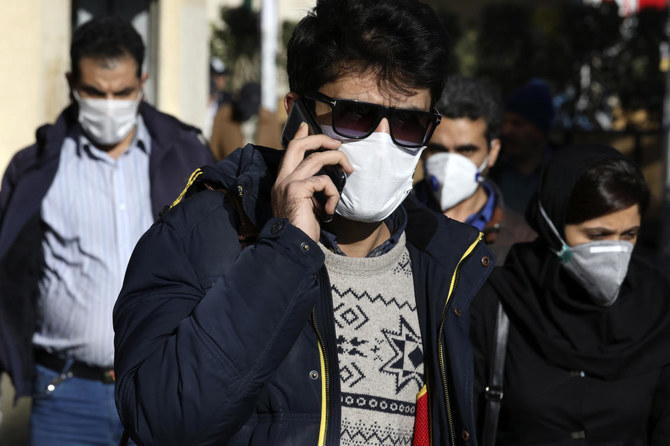
- Iranian media reports nearly 300 Iranians have been killed and more than 1,000 sickened so far by ingesting methanol
- Muslim drinkers in Iran can be punished with cash fines and 80 lashes
Israel army says kills Palestinian teen after West Bank ‘attempted attack’
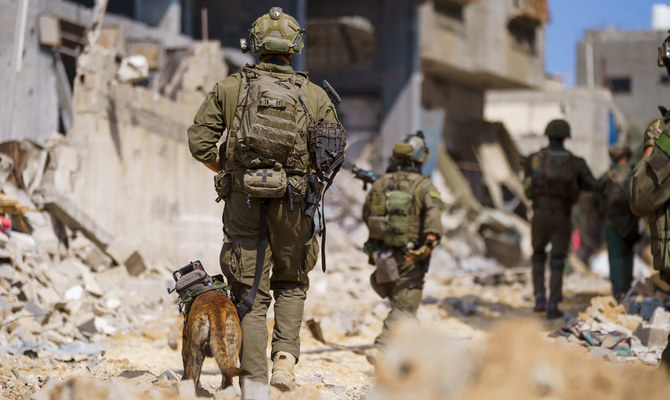
- The deadly incident took place near Hebron in the southern West Bank, the army and the Palestinian ministry said
JERUSALEM: Israel’s military said its troops killed a Palestinian assailant in the occupied West Bank, with the Palestinian health ministry identifying him as a teenager.
Israeli forces “identified a terrorist who came in their direction and attempted to carry out a stabbing attack,” a military statement said.
“The soldiers fired at him and killed him,” it said.
The Palestinian health ministry identified the fatality as Majd Shahir Aramin, 14, and said he had been killed by Israeli forces.
The deadly incident took place near Hebron in the southern West Bank, the army and the Palestinian ministry said.
The West Bank, which Israel has occupied since 1967, has seen a surge in violence for more than a year, but especially since the Israel-Hamas war erupted on October 7.
According to Palestinian officials, at least 519 Palestinians have been killed in the West Bank by Israeli troops or settlers since the start of the war in the Gaza Strip.
Attacks by Palestinians have killed at least 12 Israelis in the West Bank over the same period, according to an AFP tally of Israeli official figures.
Israeli police and Jewish pilgrims clash at beleaguered festival site
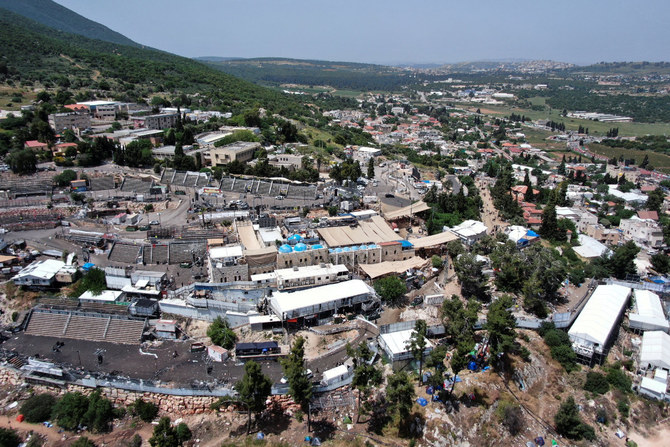
- The all-night sessions of prayer, mystical songs and dance had in previous years drawn crowds in the tens of thousands
- Police limited the number of attendees since the 2021 tragedy in which 45 people died in a crowd rush
JERUSALEM: Clashes erupted on Sunday between police and Jewish pilgrims at a religious festival site in northern Israel where three years ago 45 people died in a crowd crush, and which authorities closed this year due to rocket fire from Lebanon.
Since the 2021 tragedy at the tomb of a 2nd-century sage during the annual Lag B’Omer celebration, police have limited the number of attendees.
The all-night sessions of prayer, mystical songs and dance had in previous years drawn crowds in the tens of thousands.
This year’s festival was canceled since the site at Meron in the Galilee region has been targeted by rocket fire from Lebanon.
Many northern Israeli towns have been evacuated since Iran-backed Hezbollah in Lebanon began firing at them following Hamas’ Oct. 7 assault on southern Israel, which sparked the war in Gaza.
Both sides have traded blows since. Despite the closure, police said they turned away thousands of pilgrims over the weekend, though hundreds managed to reach the site, where things got out of hand.
The visitors damaged property and hurled objects at officers, police said. Nineteen officers were injured.
Israeli media reported that several people among the unauthorized crowd were hurt. At least one officer was suspended for pushing an older man to the ground, and police said it was examining other incidents from the site.
Ten dead, 39 injured in southern Turkiye highway collision
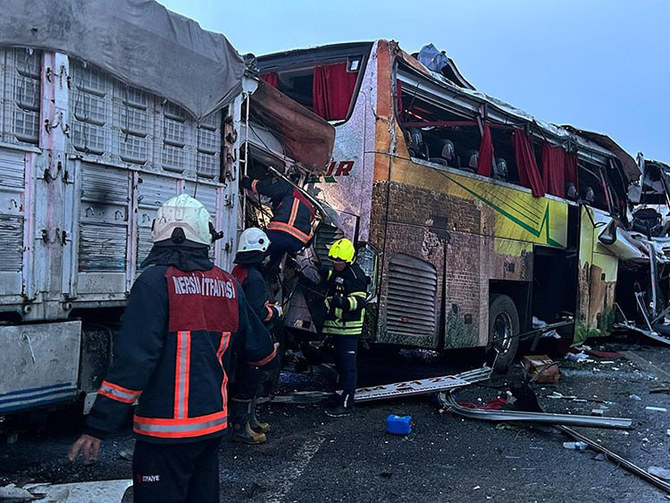
ISTANBUL: Ten people died and 39 others were injured in southern Turkiye on Sunday when an intercity bus collided with three other vehicles on a main highway, Interior Minister Ali Yerlikaya said.
The bus, traveling to Istanbul from Diyarbakir, crashed into a transport truck and two other vehicles in the Tarsus district near the Mediterranean city of Mersin, he said on social media platform X.
The government said an investigation had been launched.
Israel war cabinet to discuss new push for Gaza hostage deal
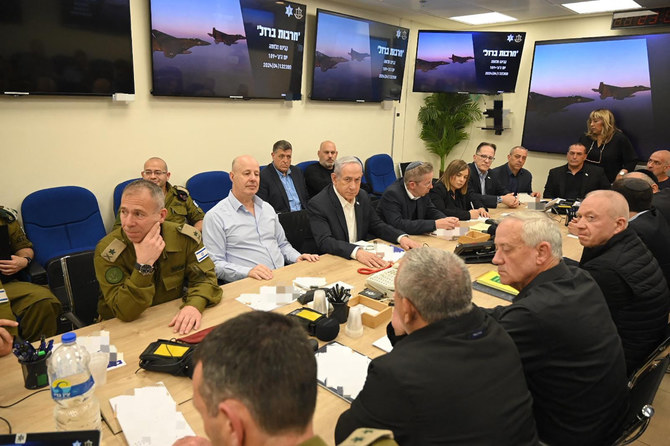
- Hamas eader Izzat Al-Rishq jas accused Netanyahu earlier Sunday of “trying to buy more time to continue the aggression"
RAFAH, Palestinian Territories: Israeli Prime Minister Benjamin Netanyahu said Sunday he “strongly opposes” ending the war in Gaza, ahead of his war cabinet convening amid intense diplomacy to forge a truce and hostage release deal.
Meanwhile deadly fighting rocked the Gaza Strip and Hamas militants fired a salvo of rockets at Israel’s commercial hub Tel Aviv for the first time in months, sending people scrambling for shelter.
Netanyahu has long rejected Hamas’s demand in negotiations for a permanent end to the fighting, which was triggered by the Palestinian militant group’s October 7 attack and has left vast areas of besieged Gaza in ruins.
A senior Israeli official, speaking on condition of anonymity, had earlier told AFP that “the war cabinet is expected to meet... tonight at 9 p.m. (1800 GMT) to discuss a hostage release deal.”
A statement issued by Netanyahu’s office before the meeting said Hamas chief in Gaza Yahya “Sinwar continues to demand the end of the war, the withdrawal of the IDF (army) from the Gaza Strip and leaving Hamas in place, so that it will be able to carry out the atrocities of October 7 again and again,” referring to the attack that triggered the war.
“Prime Minister Netanyahu strongly opposes this,” the statement said.
A member of Hamas’s political leadership, Izzat Al-Rishq, accused Netanyahu earlier Sunday of “trying to buy more time to continue the aggression.”
In Brussels, the European Union’s foreign policy chief Josep Borrell told journalists before meeting Palestinian premier Mohammed Mustafa that a strong Palestinian Authority (PA) was in Israel’s interest.
EU members Ireland and Spain, and also Norway, have said they will recognize the State of Palestine from Tuesday, drawing furious Israeli condemnation.
“A functional Palestinian Authority is in Israel’s interest too, because in order to make peace, we need a strong Palestinian Authority, not a weaker one,” Borrell said.
Mustafa, whose government is based in the occupied West Bank, said the “first priority” was to support people in Gaza, especially through a ceasefire, and then “rebuilding the institutions of the Palestinian Authority” there after Hamas seized it from the PA in 2007.
US President Joe Biden has pushed for renewed international efforts to halt the war, now in its eighth month.
The Israeli official had said Saturday that “there is an intention to renew these talks this week” after negotiations involving US, Qatari and Egyptian mediators stalled in early May.
However, Rishq said Sunday that so far, “we have not received anything from the mediators.”
He insisted on Hamas’s long-standing demand for a permanent cessation of hostilities as “the foundation and the starting point for anything.”
Netanyahu has repeatedly vowed to destroy Hamas following the October 7 attack, but has also faced growing domestic and international criticism.
The attack on southern Israel resulted in the deaths of more than 1,170 people, mostly civilians, according to an AFP tally based on Israeli official figures.
Militants also took 252 hostages, 121 of whom remain in Gaza, including 37 the army says are dead.
Israel’s retaliatory offensive has killed at least 35,984 people in Gaza, mostly civilians, according to the Hamas-run territory’s health ministry.
The military on Sunday announced the death of a soldier in north Gaza, taking to 289 the number of troops killed since Israel began its ground offensive in late October.
As the war ground on, the families of hostages still held by Palestinians militants have piled pressure on Netanyahu to secure a deal to free them.
Washington has also taken a tougher line with its close ally as outrage over the war and US support for Israel has become a major issue for Biden, seeking re-election in a battle against Donald Trump.
With more strikes reported Sunday across Gaza, Israel’s military said that over the past 24 hours it had destroyed “over 50 terror targets.”
Fighting has centered on the far-southern city of Rafah, where Israel launched a ground operation in early May despite widespread opposition over concerns for civilians sheltering there.
Rafah resident Moaz Abu Taha, 29, told AFP of “constant bombardment from land and air, which has destroyed many houses.”
Gaza’s civil defense agency said it had retrieved six bodies after a house was targeted in eastern Rafah.
Hamas’s armed wing said it had targeted Tel Aviv “with a large rocket barrage in response to the Zionist (Israeli) massacres against civilians.”
Israeli military spokesman Rear Admiral Daniel Hagari told a televised briefing that “Hamas terrorists in Gaza fired eight rockets at central Israel from Rafah.”
“Hamas launched these rockets from near two mosques in Rafah,” Hagari said. “Hamas is holding our hostages in Rafah, which is why we have been conducting a precise operation” there.
Analyst Neomi Neumann said the militants were not trying to “cause damage to Israel, but to maintain continuity of fire.”
They “shoot relatively few rockets per barrage from their diminishing arsenal, and choose when to concentrate their efforts,” said Neumann, a visiting fellow at the Washington Institute for Near East Policy think tank.
The UN has warned of looming famine in the besieged territory, where most hospitals are no longer functioning.
Amid the bloodiest ever Gaza war, Israel has faced growing global outcry over the surging civilian death toll, and landmark moves last week at two international courts.
Last Monday, the prosecutor at the International Criminal Court announced he was seeking arrest warrants for Netanyahu and his defense minister as well as for three top Hamas figures.
And on Friday, the International Court of Justice ordered Israel to halt its Rafah offensive or any other operation there that could bring about “the physical destruction” of the Palestinians.
Palestinian medics say Israeli airstrikes on refugee camp in Rafah kills 35
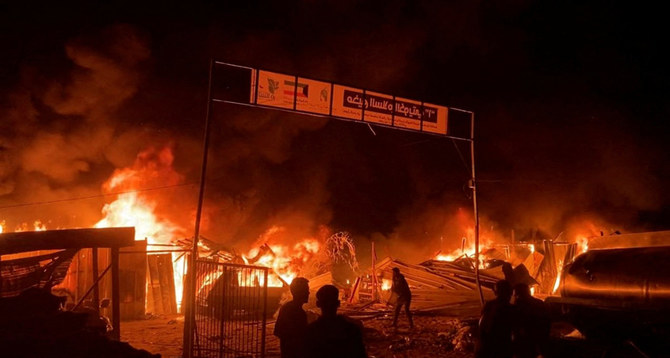
- The attacks came two days after the International Court of Justice ordered Israel to end its military offensive in Rafah
- Israel’s army confirmed the strike and said it hit a Hamas installation and killed two senior Hamas militants
DEIR AL-BALAH, Gaza Strip: Palestinian health workers said Israeli airstrikes killed at least 35 people Sunday and hit tents for displaced people in the southern Gaza city of Rafah, and “numerous” others were trapped in flaming debris. Gaza’s Health Ministry said women and children made up most of the dead and dozens of wounded.
The attacks came two days after the International Court of Justice ordered Israel to end its military offensive in Rafah, where more than half of Gaza’s population had sought shelter before Israel’s incursion earlier this month. Tens of thousands of people remain in the area while many others have fled.
Footage from the scene of the largest airstrike showed heavy destruction. Israel’s army confirmed the strike and said it hit a Hamas installation and killed two senior Hamas militants. It said it was investigating reports that civilians were harmed. Defense Minister Yoav Gallant was in Rafah on Sunday and was briefed on the “deepening of operations” there, his office said.
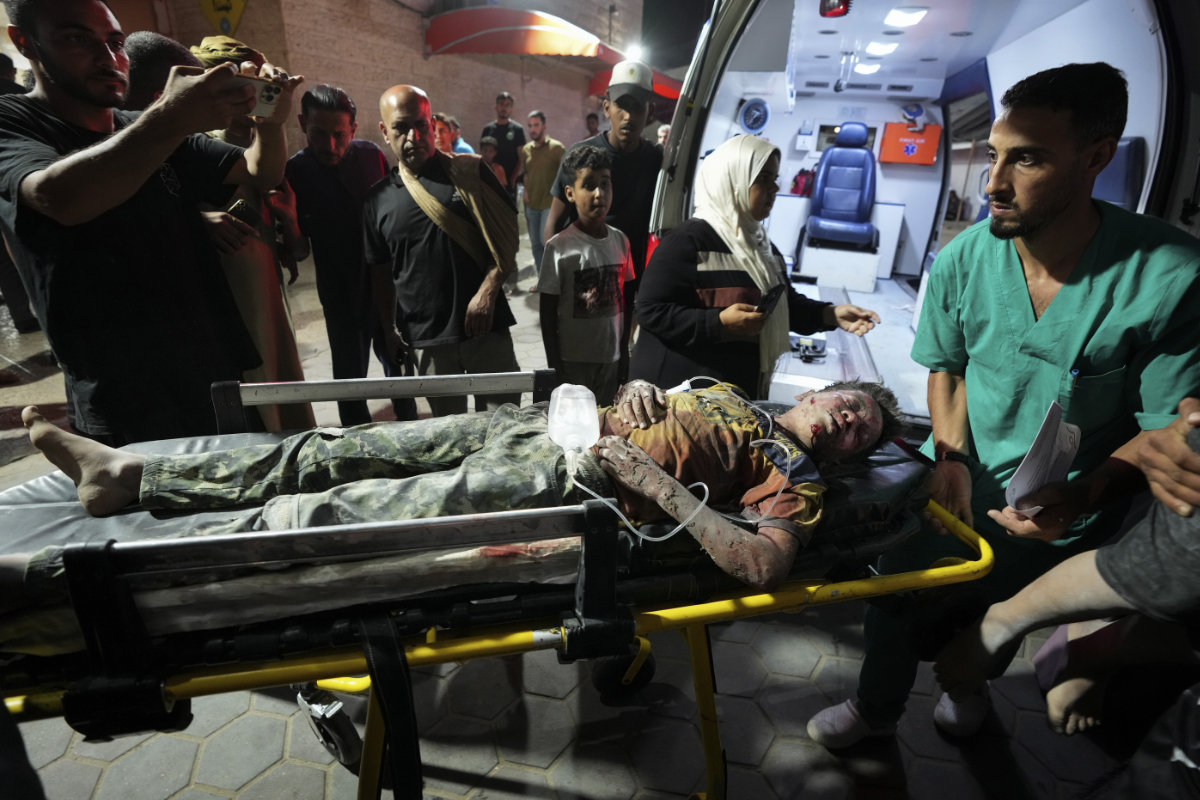
A spokesperson with the Palestinian Red Crescent Society said the death toll was likely to rise as search and rescue efforts continued in Rafah’s Tal Al-Sultan neighborhood about two kilometers (1.2 miles) northwest of the city center.
The society asserted that the location had been designated by Israel as a “humanitarian area.” The neighborhood is not included in areas that Israel’s military ordered evacuated earlier this month.
The airstrike was reported hours after Hamas fired a barrage of rockets from Gaza that set off air raid sirens as far away as Tel Aviv for the first time in months in a show of resilience more than seven months into Israel’s massive air, sea and ground offensive.
There were no reports of casualties in what appeared to be the first long-range rocket attack from Gaza since January. Hamas’ military wing claimed responsibility. Israel’s military said eight projectiles crossed into Israel after being launched from Rafah and “a number” were intercepted, and the launcher was destroyed.
Earlier Sunday, dozens of aid trucks entered Gaza from southern Israel under a new agreement to bypass the Rafah crossing with Egypt after Israeli forces seized the Palestinian side of it earlier this month. Israel’s military said 126 aid trucks entered via the nearby Kerem Shalom crossing.
But it was not immediately clear if humanitarian groups could access the aid — including medical supplies — because of fighting. The crossing has been largely inaccessible because of Israel’s offensive in Rafah. United Nations agencies say it is usually too dangerous to retrieve the aid. The World Health Organization last week said an expanded Israeli incursion in Rafah would have “disastrous” impact.”
“With the humanitarian operation near collapse, the secretary-general emphasizes that the Israeli authorities must facilitate the safe pickup and delivery of humanitarian supplies from Egypt entering Kerem Shalom,” the spokesperson for UN chief Antonio Guterres said in a statement.
Egypt refuses to reopen its side of the Rafah crossing until control of the Gaza side is handed back to Palestinians. It agreed to temporarily divert traffic through Kerem Shalom, Gaza’s main cargo terminal, after a call between US President Joe Biden and Egyptian President Abdel Fattah El-Sisi.
The war between Israel and Hamas has killed nearly 36,000 Palestinians, according to Gaza’s Health Ministry, which does not distinguish between civilians and fighters in its count. Israel blames civilian deaths on Hamas because the militants operate in dense, residential areas.
Around 80 percent of Gaza’s 2.3 million people have fled their homes, severe hunger is widespread and UN officials say parts of the territory are experiencing famine.
Hamas triggered the war with its Oct. 7 attack into Israel, in which Palestinian militants killed some 1,200 people, mostly civilians, and seized some 250 hostages. Hamas still holds some 100 hostages and the remains of around 30 others after most of the rest were released during a ceasefire last year.
Israeli Prime Minister Benjamin Netanyahu has said Israel must take over Rafah to eliminate Hamas’ remaining battalions and achieve “total victory” over the militants, who recently regrouped in other parts of Gaza.
The war has also heightened tensions in the Israeli-occupied West Bank. Palestinian authorities on Sunday said Israeli forces shot dead a 14-year-old boy near the southern West Bank town of Saeer. The Israeli army said the Palestinian male was shot dead after trying to stab Israeli forces at Beit Einun Junction.
Southern Gaza largely cut off from aid
Southern Gaza has been largely cut off from aid since Israel launched what it called a limited incursion into Rafah on May 6. Since then over 1 million Palestinians, many already displaced, have fled the city.
Northern Gaza receives aid through two land routes that Israel opened during global outrage after Israeli strikes killed seven aid workers in April.
A few dozen trucks enter Gaza daily through a US-built floating pier, far below the 150 trucks a day that officials hoped for. Aid groups say 600 trucks a day are needed.
Israeli man detained over mutiny threat
Israel’s military said it had detained a suspect over a widely circulated video in which a man dressed as a soldier threatens mutiny. The man says tens of thousands of soldiers were ready to disobey the defense minister over his suggestion that Palestinians should govern Gaza after the war, and pledged loyalty to Netanyahu alone.
Israeli military spokesman Rear Adm. Daniel Hagari said the man has been removed from reserve duty. It was not clear when or where the video was made. The prime minister’s office released a brief statement condemning all forms of military insubordination.



